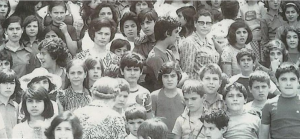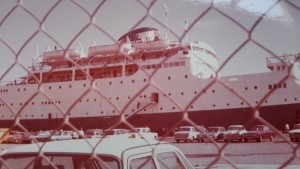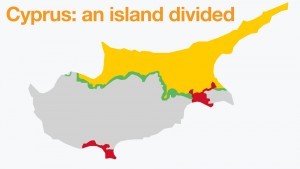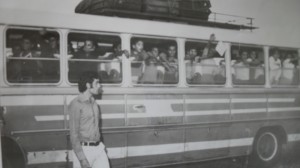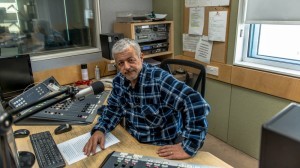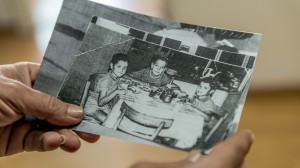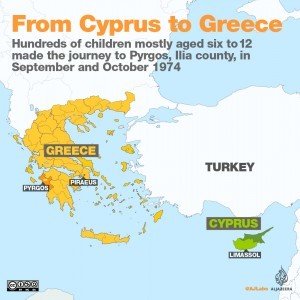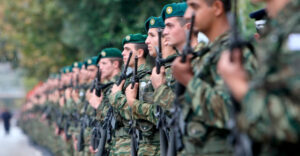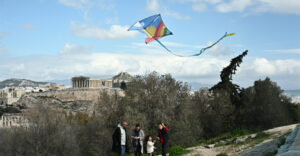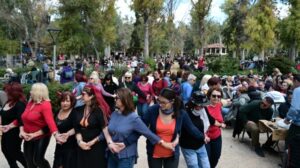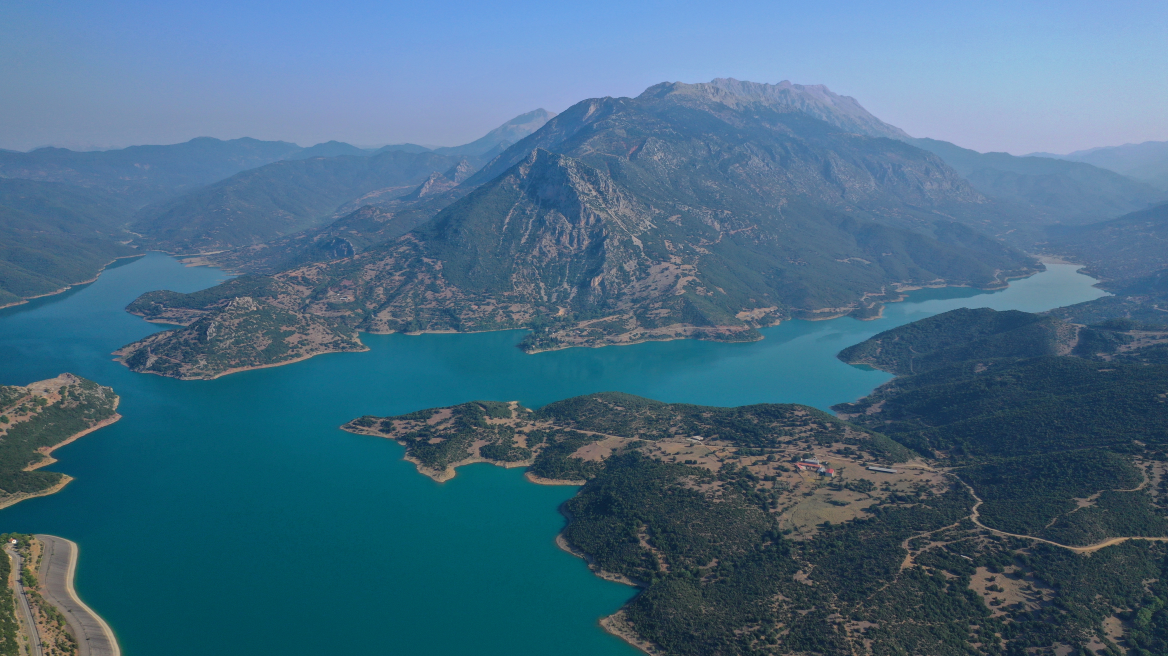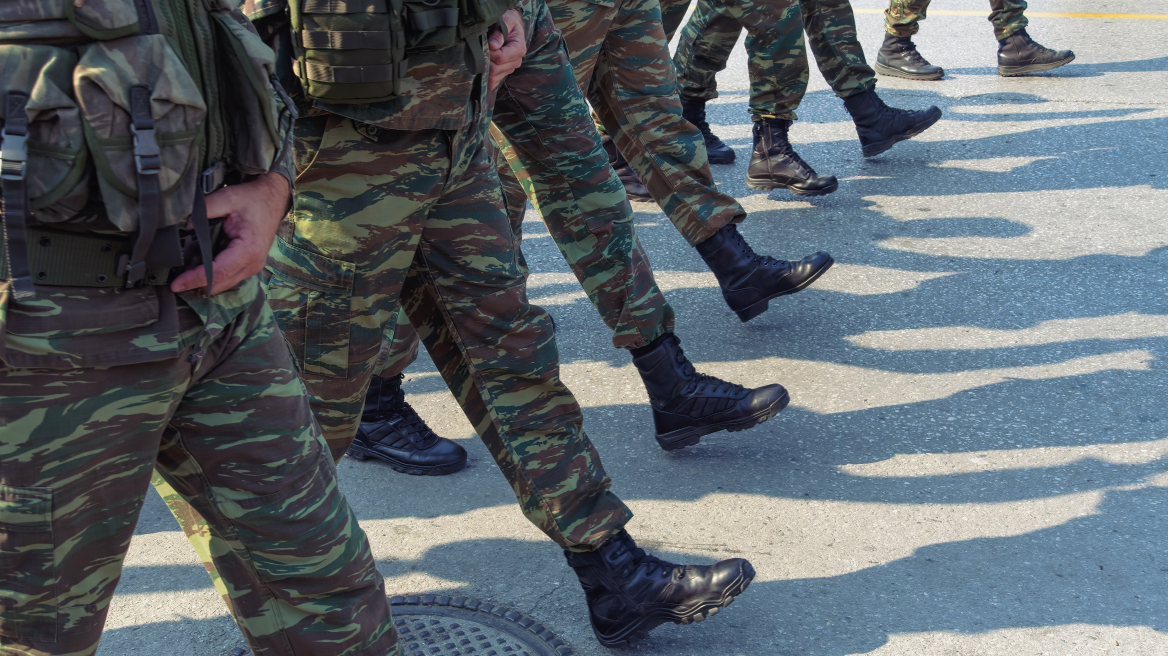Nine-year-old Mihalis Mihail had never seen a ship before, let alone been on board one. Yet there he stood, anxious and confused on the deck of The Patra, about to embark on a journey that would change his life forever.
The port of Limassol in southern Cyprus stirred with unusual commotion that hot September day in 1974.
It was a disorderly scramble as scores of children, some as young as six, buzzed around their solemn, gloomy-eyed parents in the shadow of the large passenger ferry tied to the dock.
As the gangway of The Patra opened, the children clambered nervously aboard. Their parents, however, remained still.
“None of us knew where we were going, why we were leaving and for how long,” recalls Mihail, now 52. “We were heading into the unknown, and we were scared.”
(The Patra docked in Limassol port)
Two months earlier, a right-wing coup supported by Greece’s dictatorship sought to depose Cypriot president, Archbishop Makarios III. While the July 1974 putsch failed, Turkey swiftly responded by sending its troops into Cyprus and seizing the northern third of the island.
The invasion led to a north-south partition that remains to this day, with Cyprus divided from the east, through the capital, Nicosia, to the west.
Up to 200,000 Greek Cypriots sought refuge in the south, while a smaller population of Turkish Cypriots living in southern towns and villages made the opposite journey later on.
(Grey: Greek Cyprus – Yellow: Turkish Cyprus – Green: UN Buffer Zone – Red: British military base)
As chaos began to unfold on July 20, Mihail, his 10-year-old brother Petros and their parents hurriedly abandoned their home in Gerolakkos, a Greek Cypriot village northeast of Nicosia, and sought refuge in Mitsero, a village on the Greek Cypriot side.
While they were safer, fears over what could happen next were palpable.
So when a local radio announced that a ship would leave Limassol as part of an effort to take children to Greece – where they could temporarily escape the uncertainty gripping Cyprus – Mihail’s parents were among the many who did not think twice.
“It was a very difficult decision for the parents,” says Mihail. “It was the looming fear of the unknown – a fear of a total capture of Cyprus and even killings – that made them do this. They thought that at least some of their children would be saved.”
The Patra operation was rushed, hastily organized after a bishop in western Greece wrote a letter to Cyprus’s education ministry to say that church-run boarding houses and local families were willing to host Greek Cypriot children for at least a school year.
The hope was to provide the boys and girls with a reprieve from the instability in Cyprus at the time.
About 200 children aged mostly between six and 12 ended up boarding The Patra.
There was no passenger list, so anyone who arrived that morning in September could get on board, and a head count was only conducted after the ship had sailed.
“We were alone among strangers,” says Giorgos Georgiou, a current member of the Republic of Cyprus parliament who made the trip at age 11. He remembers hearing the “drawn-out cries” of other scared children on board.
The young passengers didn’t know where they were headed, took no money and only a few personal belongings, and had only one adult accompanying them.
“My brother and I had a small suitcase with just two or three clothing items each,” says Mihail. “Some children simply had a small nylon bag with one pair of trousers; others came with only their underwear.”
(The children boarded buses waiting for them at Piraeus port)
After almost three days at sea, the ferry pulled into the port of Piraeus near Athens.
Rows of buses were waiting for the children, who still did not know where they were going. After several hours on the road, the buses pulled up to a large boarding house in Pyrgos, in western Greece’s Ilia county.
A few days later, the children were told to gather in the dining area. “Suddenly, the doors opened, and people started coming in,” Mihail remembers.
“They began choosing children – ‘I want this one, I want that one’ – while some were asking the children, ‘Do you want to come with us?’ It was a friendly atmosphere.”
In total, about 415 boys and girls would make the same journey from Cyprus to Greece on three separate trips organized by the Greek Orthodox Church in September and October 1974.
Most of the children were taken into foster care by families in Ilia – many of whom worked as farmers or low-wage labourers and had very little money but took on all the costs of hosting them. Others remained in boarding houses across Ilia.
The majority of the children spent a year in Greece, before returning to a newly divided Cyprus to live in the settlements built to house their uprooted families. Others stayed in Greece for up to two years, while a handful never went back to Cyprus at all.
Yet, the children’s journey has remained a mystery in Cyprus until only recently – a little-known episode of a long-running conflict that has scarred almost everyone across the island.
“As I grew older, I realized that, for Cypriots, this is an unknown tale,” says Mihail, now a journalist and author who been leading an effort to bring together those who went through experiences similar to his as a child.
During his research, he discovered that no public records were available, lost as the years went by, if they existed at all. The bishop’s letter and the passenger lists had also vanished, while most government officials were entirely oblivious to what had transpired.
“It was as if there was a veil of silence,” says Mihail. “The only ones who knew were those who had sent their children [away] and some of their relatives.”
(Mihail, now a journalist, is leading an effort to bring this little-known episode of the conflict to light)
Mihail and his brother managed to stay together when they were put into a foster home: the siblings were taken in by a Greek couple that already had an 11-year-old son.
“They gave us love and treated us as if we were also their children,” says Mihail, who stayed in Greece for nearly a year before going back to his parents in Cyprus. “We developed bonds that are strong to this day – it’s like being part of two families.”
Georgiou recalls a similarly loving experience.
Originally from Assia, the village from which the highest number of Greek Cypriots remain missing from the 1974 events, Georgiou says he was desperate for a new start after his family sought shelter in the south.
“My family and I had been captives in the village for about two weeks. Three of our relatives were killed,” he says. “It was a very ugly experience, seeing all these things happening, so I wanted to get out – I wanted to leave this situation behind.”
After making the journey to Greece, Georgiou was taken in by an elderly couple with no children. At the end of the school year, his hosts wanted him to live with them permanently. “They wanted to adopt me, but that was not possible, my parents wouldn’t accept that,” he says.
(Mihail holding an old photograph showing him (L), his brother Petros (R) and Giorgos (C), son of the family hosting them)
After returning to Cyprus, Georgiou and Mihail would occasionally go back to visit their Greek hosts, whom they lovingly referred to as uncles and aunts.
During a trip to Greece in the 1990s, Georgiou found out his “uncle” had passed away. Since his “aunt” had died years earlier, the news was particularly devastating.
“I cried perhaps more than when my father died – it was the end of an era of my life,” he says, his voice breaking.
“There are no words to describe what these people did for us during that year … They were poor, but they opened their homes, their hearts and souls and showered us with so much love.”
“Emotionally painful”
Yet not everyone had such a positive experience.
“I would describe it as emotionally painful,” says Niovi Kerkidou, who was seven when she traveled to Greece after her family fled Katokopia, a village north of the Cyprus partition line.
Kerkidou lived in a boarding house and says while the Greek staff showed “care, love and kindness” to the children, her life was also dominated by a strict routine and innumerable rules.
Sunday afternoons were especially difficult because that’s when potential foster families would arrive.
“During the week, we would be forming friendships, and then these meetings would occur, and you would see your friend leave,” says Kerkidou.
“Children who also wanted to move in with a family were left with a sense of loss and rejection – and these were my feelings then, too.”
Now 51, Kerkidou says she now fully appreciates the support she received from people in Ilia. An accountant by trade, she is writing a book titled Thank You, which details the personal accounts of children who went through experiences similar to hers.
In January, Kerkidou returned to the boarding house for the first time since she left in 1975.
She was joined by Mihail, Georgiou and 70 others, all of whom wanted to pay tribute to the people who had sheltered them all those decades ago.
“Our visit was like paying back a debt, to honour these people and show them our eternal gratitude,” says Georgiou.
For Mihail, one of the organizers of the trip, the events of 1974 are always with him.
“Not a single day passes where I will not see something on the street, or listen to a song, or have a conversation [or] hear a specific word, that will bring to mind that period of time,” he says.
“Even though it’s been almost 44 years, all these [things] constantly swirl in my mind.”
Source: Teo Kermeliotis/aljazeera.com
Ask me anything
Explore related questions
